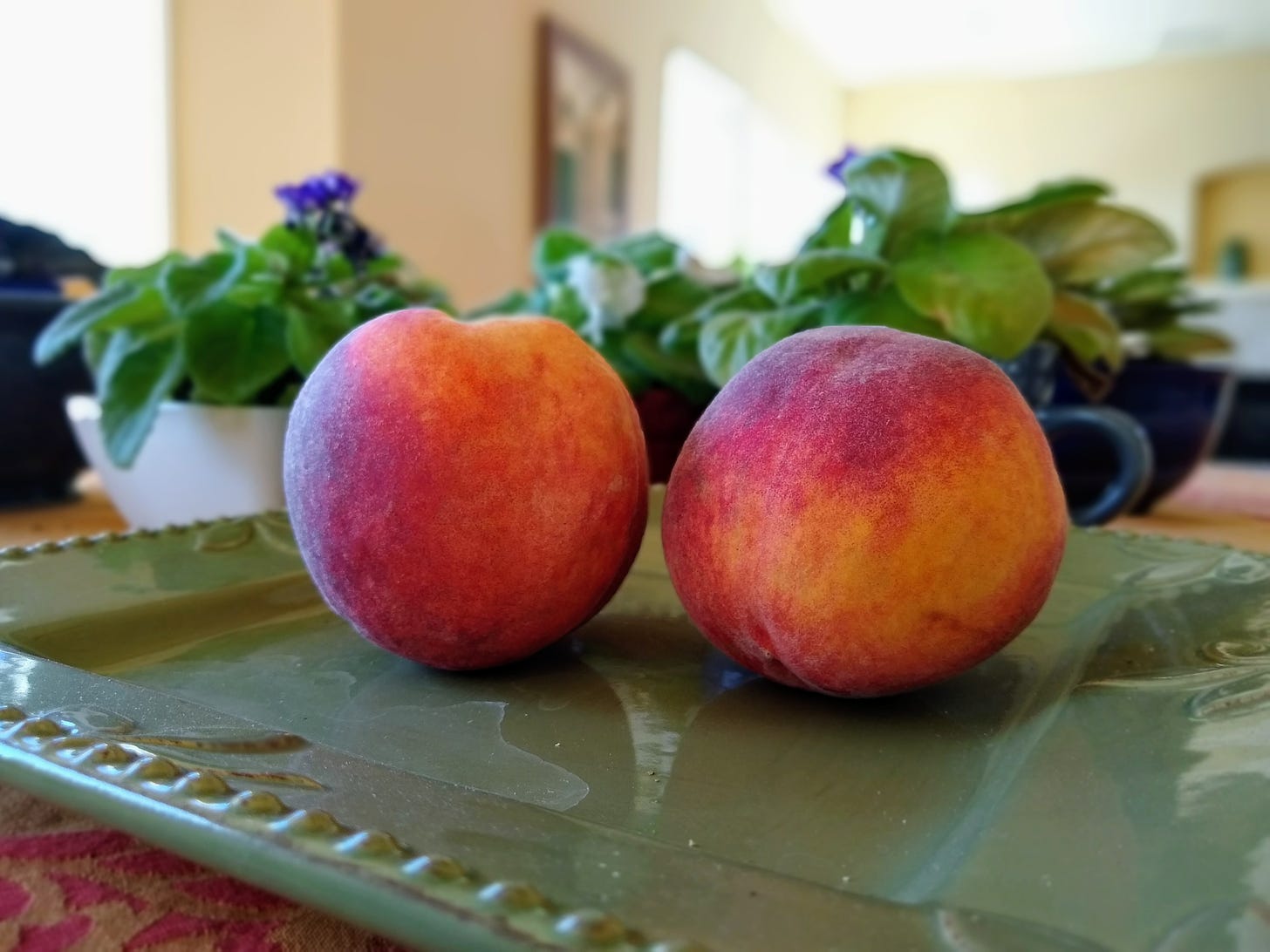“Life is amazing. And then it's awful. And then it's amazing again. And in between the amazing and awful it's ordinary and mundane and routine.” -L.R. Knost
I am experiencing a surge of optimism or perhaps, more accurately, the absence of pessimism. I have no idea why. I just needed to report/mark this moment because who knows how long it will last?
I chalk it up to a week that by any measure was fairly ordinary. If it played out on a giant Zoom screen for all of you, you’d be asleep in five minutes. You’d see me getting up at 5:15 every morning, swigging water, then a little coffee, and writing a thousand words before ten o’clock. You’d see me picking up dog poop in the backyard, watering the veggies, or masking up and walking Rina around the block a few times. You’d see me sitting in a laundromat happily listening to this while two weeks worth of newly laundered clothes thumped in the dryers nearby. I had chats, long and short, with on the phone or FaceTime — all with people I love. I contributed my time to people, places and causes that matter to me. And other stuff, equally ordinary, equally boring. I felt almost…normal.
Normal tastes good, like a balanced meal after months of absorbing too much fear, too much anger, too much doom. If this is what the new normal can feel like, bring it on.
What does normal feel like for you these days?
And the winner is…
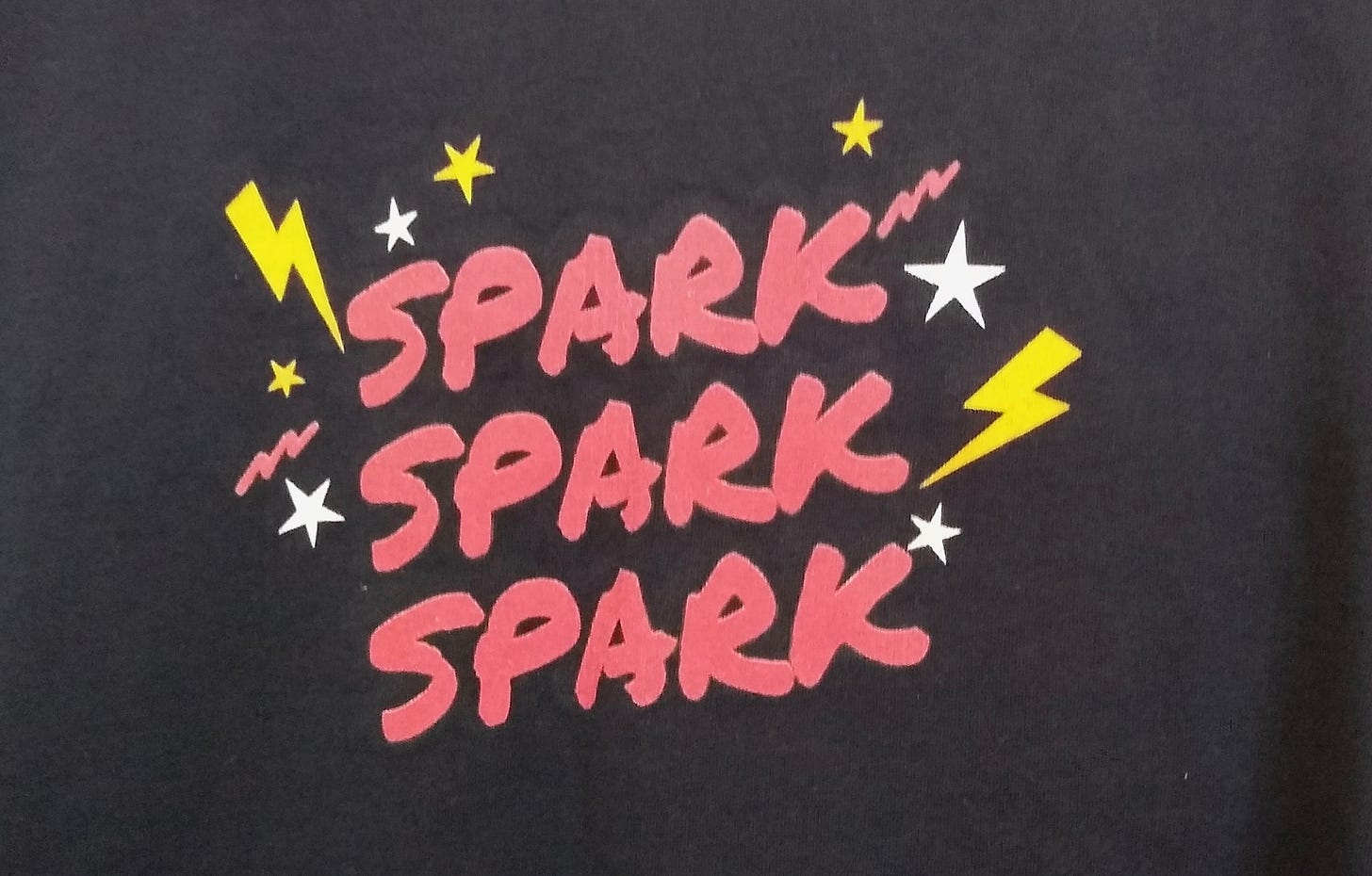
I’m thrilled to announce that Spark subscriber Beth K. won the drawing for a $20 gift posted in last week’s issue of Spark. She chose a copy of Alice Munro’s “Dear Life” from our Spark Community Bookshop page. I’m looking forward to future giveaways so keep an eye out for more special offers to subscribers.
Slow Reads: Plague-Defying Stories
So far, I’ve resisted novels that touch on plagues, pestilence, contagion, and quarantine. There are plenty out there as this list confirms. The books most compelling books listed here are not the ones that terrify but the ones that reaffirm something important about life whether there is a plague or not. One of my favorite books of all time, “Love in the Time of Cholera,” is on this list. Another book I’ve longed wanted to read, “The Decameron,” is not. I’m going to read and savor both over the next several weeks and I invite you to join me.
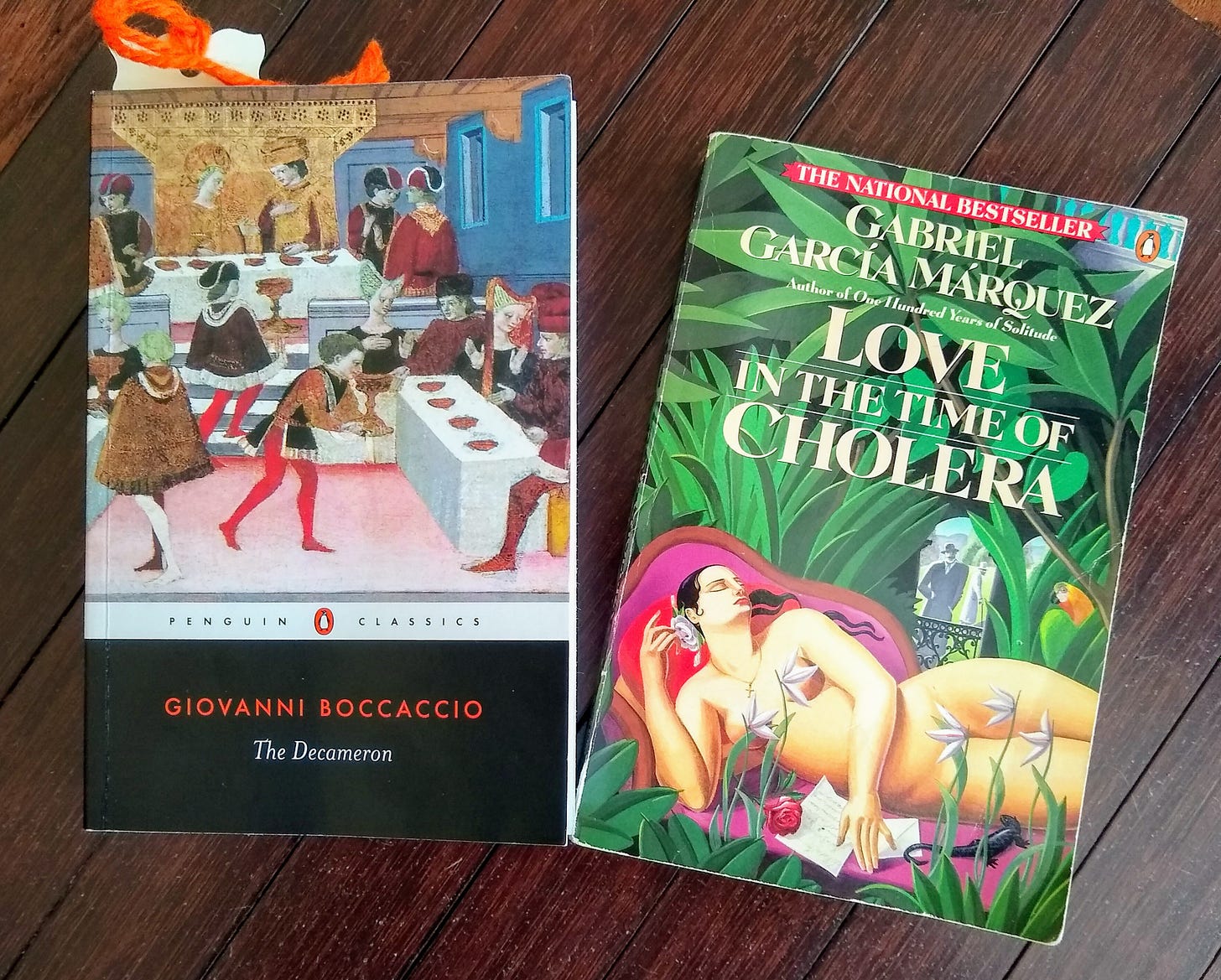
“Love in the Time of Cholera,”
“The Captain looked at Fermina Daza and saw on her eyelashes the first glimmer of wintry frost. Then he looked at Florentino Ariza, his invincible power, his intrepid love, and he was overwhelmed by the belated suspicion that it is life, more than death, that has no limits.” - Gabriel Garcia Marquez, Love in the Time of Cholera
If you haven’t read it, “Love in the Time of Cholera,” by Gabriel Garcia Marquez is the story of the unrequited love of Florentino Ariza for Fermina Daza that is finally consummated aboard a river boat after more than fifty-three years of pursuit and longing. Cholera is a fact of life in their part of the world during that time but they are untouched by it and in fact, near the end, when they have found each other, use the disease as a way to linger in the world they’ve created on the boat. Love and cholera aside, there are many moments in this book that make me laugh out loud.
Here is the trailer for the movie version which I’ve never seen even though it came out in 2014. I’m not sure I will. The book was too perfect and this looks a little too…mushy. If you’re tempted, you can find it on all the usual streaming services.
“The Decameron” by Giovanni Boccaccio goes further back in time, to Florence of the late 1340s, when the bubonic plague devastated the city. Seven women and three men travel with their servants to an estate outside the city where they remain for fourteen days, safe. Every day they tell each other stories and in these stories, give each other the gift of laughter or tears or an idea that, combined, fortifies them and allows them to return, as explained so well by Rivka Galchen in her recent NYT essay for The Decameron Project.
“They returned because having laughed and cried and imagined new rules for living altogether, they were then able to finally see the present, and think of the future…Memento mori — remember that you must die — is a worthy and necessary message for ordinary times, when you might forget. Memento vivere — remember that you must live — is the message of “The Decameron.” - Rivka Galchen
I recently pulled “Love in the Time of Cholera,” from my bookshelf and placed it on my TBR pile to read again along with my newly purchased copy of “The Decameron.” I plan to savor them.
A few shorter, plague-defying reads:
Inspired by “The Decameron”, The New York Times Magazine commissioned 29 short stories by writers from around the globe. My three favorites read a little like the original Decameron stories — meant to entertain, draw the eye away from the disaster so that when I looked again, I can see everything more clearly: The Rock by Leila Slimani, Impatient Griselda by Margaret Atwood, and The Morningside by Tea Obreht.
And, desperate for something new to read but hampered by the quarantine, Mark Oppenheimer raided his wife’s book collection. He wrote about that here in My Wife’s Library. This came to me from my husband who knew I would love it. I share it with you here not only because it is loaded with great ideas for books to read but because it is a fun reminder of how who we are is reflected in the spines of the books that pile up on our side of the bed.
And Now: The Spark Interview
Thanks to Caroline Leavitt, I’m thinking about comas. She once spent three months in a drug-induced sleep and has been haunted not by what she can remember but by what she cannot. All those who loved her were marked by this event but cannot, for their own well-being, share with her what happened. So she will never truly know what happened during three months of the life she came very near to losing altogether.
Being a novelist, she wrote about it first in her novel “Coming Back to Me,” and again in “With or Without You” which hits the stores on August 4th and can be pre-ordered right now. In our Spark Interview, Caroline explains why she revisited this part of her life in fiction not once but twice. If you’d like to get a look at the first chapter, you’ll find it here. For a fascinating glimpse of the real story behind the novel, go to her essay in The Daily Beast: "I was in a Coma and No One Will Tell Me What Happened."
Here is what Caroline looks like
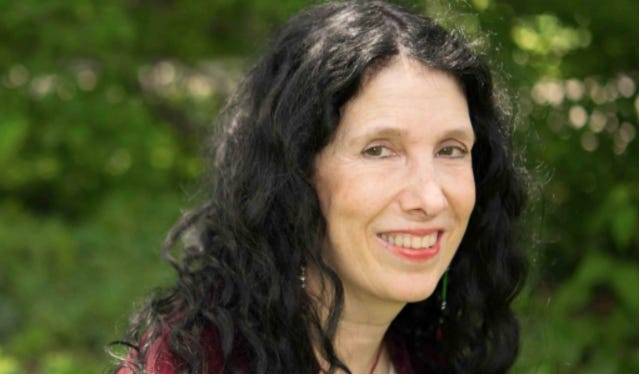
And here’s her bio:
Caroline Leavitt is a New York Times bestselling author who has published eleven novels and probably has two more in progress as you read these words. She is a fountain of energy, a tireless supporter of other writers (she read my first novel and gave me a blurb I cherish to this day), an editor, a screenwriter, a teacher, and the co-founder of A Mighty Blaze, launched in March to support writers whose books came out right when the world shut down. Among her novels are the best sellers “Pictures of You” and “Cruel Beautiful World.” She conducts interviews with authors on her blog which is a wonderful place to discover new books and to hear from authors directly the stories behind their stories.
And here’s the Spark Interview
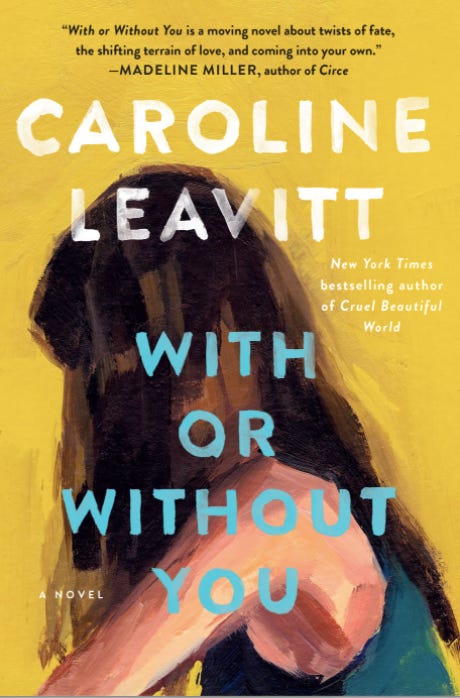
SPARK: “With or Without You” is your 12th novel and the second one you've written that comes out of a trauma you experienced involving a medically-induced coma. What compelled you to go back to this subject and how did writing it affect you? Do you think you are done with it now?
CL: I think I’m done! The first time was shortly after I came out of the coma but I couldn’t remember anything, and I thought maybe distancing myself by creating a character would help. It only helped a little, and for years afterwards, I still had all these weird PTSD triggers and I’d never know why. And I was always afraid to go to sleep.
Then the pandemic came, and Jeff, my husband, mentioned that the only time he ever felt this kind of dread was when I was in coma, which took me by surprise, because like most of the people around me, he had been so traumatized, he couldn’t talk about it. And I began to think about the whole idea of memory and I thought if I could write about a woman who remembered everything in her coma and was changed, I could heal.
So I did. And I did. But more than that, in my research, I found that a lot of people come out of comas not just with personality changes, but with their brains rewired. They suddenly have amazing new talents. A woman woke speaking fluent Mandarin, quit her job and moved to China! A man woke a piano virtuoso and began filling concert halls. That part of the story really fascinated me. What happens when we change? How does it impact us—and those who love who we used to be?
SPARK: I was intrigued when I read that Stella, your protagonist, is "middle-aged," a period that I view as fertile ground for change and possibility, especially for women. For many of us with a dream in our hearts it's a "now or never" time but it is also a time when energy and resources are not unlimited. How old are the key characters in your novel and
CL: Oh, I’m so glad you brought that up. It was important to me that they be in their 40s. Both Stella and Simon are 43 and 44 (I changed their ages so many times in the novel because I screwed up my timeline, but I think that is accurate.) It’s a turning point for people, especially Simon who wants to regain his Rockstar status, and Stella, who knows she doesn’t have much time if she wants to have a child. So much about the book was me pondering the question of what it means to grow up. A lot of people in their forties are “settled.” Living in a home, husband, kids, job—but life is not meant to be lived in a way that is “settled.” I truly believe that it really never IS too late, that you cannot know what is going to happen next, and you might as well try for what you dream of. Maybe you won’t get it, but you might get something else you never expected, something better.
SPARK: How do you feel about this book compared to your other novels or novels you have in progress? Have you written the book or story I sometimes think of as "the book of my heart"-- the one that you believe you must write no matter what -- or is that yet to come? Or is that even a thing for you -- do you love all of your books as my mother loved each of her many children "all in different ways?"
CL: All of my books have haunted me and have been of my heart, EXCEPT for my third novel, called “Jealousies.” My first publisher had gone out of business and I was picked up by a new publisher who wanted me to write something that was really “commercial.” She sketched out a plot for me and I felt sort of strange about it, but I was really young and I wanted to be published, and I hammered that novel out. And EVERYONE hated it. Well, I got just two advance reviews, the nastiest Kirkus I have ever seen, and an even nastier Publisher’s Weekly. The truly interesting thing is that it’s only been last year that I was able to look at those reviews again, and that book. And I realized that the reviews were absolutely spot-on right. And the reviews were awful because I had not had my heart in that book. I hadn’t cared about the characters or the situation and I was just writing to fill up pages. Of course, while I was hysterically crying about those reviews, I didn’t realize that they were teaching me a really, really important lesson. Write about what haunts you. Write about what is in your heart. Write about what obsesses you and you personally need to figure it out.
And P.S. Please, don’t go and find that book. It’s truly dreadful. Really.
SPARK: As one of your followers on social media, I imagine your life as packed to the brim with writing, teaching, family, supporting the work of other writers, and making sure that your books reach readers. It looks like a lot from afar. Writer and activist Grace Paley once said, "Life is too short, and art is too long." What do you think of when you read these words? Have there been moments when life has seemed to be racing by for you or that you have questioned your decisions? How has this affected your life choices and what you choose to write about?
CL: Oh my God, such a great question. And the answer is yes. Sometimes it is too much and it took me a really, really long time to be able to say, I can’t hold down a nine- to-five job and then come home and raise a child and nourish my marriage and write, too. I told myself, “oh, if I have $500K in the bank, I can quit this time-consuming job and stay home and write.” And of course I never had $500K in the bank. But then I got sick, and I had this feeling that I had to make everything in my life matter more, so I while I could physically do my nine-to-five job, I could no longer spiritually do it. And I quit! And it was the most wonderful decision!
There still is way too much on my plate. I’m learning to say no, I can’t do this. Or just calming myself down and letting things go in a what will be will be attitude. I’ve cut back on some of the work I’ve been doing.
What I realize, what I really want to write about is the whole idea of change at any minute, that we DO all contain multitudes. We CAN do so much that we don’t think we can. But the key is to focus on what is important to you, what matters, what is going to enrich your life and the lives of others.
SPARK: And because I'm interviewing Caroline Leavitt, I must ask these two questions: What is obsessing you now? And is there anything I haven't asked that I should have?
CL: Ha! That made me laugh. I am totally obsessed with the surreal quality of our world. The planet is dying and that scares me. The virus is spreading and that terrifies me. Our government is corrupt. I just want everything and everyone to be okay.
SPARK: And here is a question: What weird thing do you believe?
CL: I am kind of a quantum physics junky and I truly believe that there is no time, that everything is happening at once, and we just haven’t discovered a way to access that yet.
That’s it for this week. Next week we’ll be talking animals. Or friends. We’ll see what the universe brings. If you’ve got something you’d like to see here, let me know! Until then, let me know how you are doing, what you are wondering about and what you are reading. It’s always really good to hear from you in the comments below or in my inbox. I am grateful for all of you.
Remember, I’ll add the books you’re reading or want to read to our list on Bookshop.org. If you’re prompted to add any of them to your collection, remember that every order from this list helps independent bookstores and can earn a little money over time that we can donate to literacy programs
P.S. And now, your moment of Zen…before the first bite
